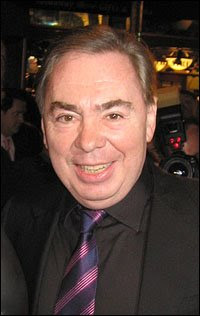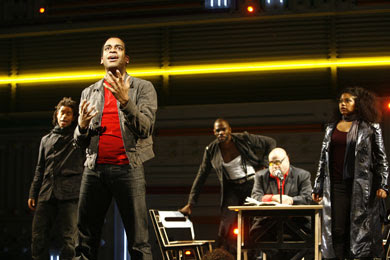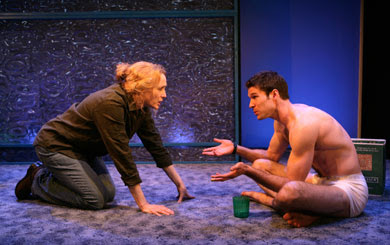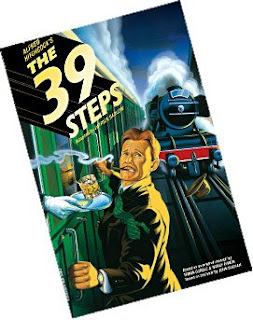 I thought his cat had put an end to this nonsense.
I thought his cat had put an end to this nonsense.Apparently not.
If you must know, click here. Have a drink first.
(BTW, Is he gearing up to replace George Wendt in Hairspray?)
 I thought his cat had put an end to this nonsense.
I thought his cat had put an end to this nonsense. "reasons to be pretty" presented by MCC Theater at the Lucille Lortel Theatre, May 23, 2008
"reasons to be pretty" presented by MCC Theater at the Lucille Lortel Theatre, May 23, 2008 "Passing Strange" at the Belasco Theatre, May 17, 2008
"Passing Strange" at the Belasco Theatre, May 17, 2008 "Inner Voices: Solo Musicals" presented by Premieres at The Zipper Factory Theater, May 14, 2008
"Inner Voices: Solo Musicals" presented by Premieres at The Zipper Factory Theater, May 14, 2008Tres Ninas, by Ellen Fitzhugh and Michael John LaChiusa, will be directed by Jonathan Butterell, with music direction by Todd Almond. Tony Award Winner Victoria Clark stars. The musical tells the story of a white American woman's affecting and being affected by 'The Other" at three stages of her life.
Alice Unwrapped, by Laura Harrington and Jenny Giering, is directed by Jeremy Dobrish with music direction by Julie McBride. Jennifer Damiano stars. In it, a fifteen year-old girl has big shoes to fill with her dad missing in action, Mom refusing to come out of her bedroom, and a younger sister demanding normalcy - or else.
A Thousand Words Come to Mind, by Michele Lowe and Scott Davenport Richards, is directed by Jack Cummings III, with music direction by Jon DiPinto. Tony Nominee Barbara Walsh stars. When a mother's legendary silence is broken as she lies dying in a hospital room, her daughter embarks on a journey into the power of the unspoken word. "No, No, Nanette" presented by Encores! at City Center, May 11, 2008
"No, No, Nanette" presented by Encores! at City Center, May 11, 2008 "Substitution" presented by The Playwrights Realm at the Soho Playhouse, May 7, 2008
"Substitution" presented by The Playwrights Realm at the Soho Playhouse, May 7, 2008 The 2008 Tony Award Nominations
The 2008 Tony Award NominationsAugust: Osage County
Author: Tracy Letts
Producers: Jeffrey Richards, Jean Doumanian, Steve Traxler, Jerry Frankel, Ostar Productions, Jennifer Manocherian, The Weinstein Company, Debra Black/Daryl Roth, Ronald & Marc Frankel/Barbara Freitag, Rick Steiner/Staton Bell Group, The Steppenwolf Theatre Company
Rock ‘n’ Roll
Author: Tom Stoppard
Producers: Bob Boyett & Sonia Friedman Productions, Ostar Productions, Roger Berlind, Tulchin/Bartner, Douglas G. Smith, Dancap Productions, Jam Theatricals, The Weinstein Company, Lincoln Center Theater, The Royal Court Theatre London
The Seafarer
Author: Conor McPherson
Producers: Ostar Productions, Bob Boyett, Roy Furman, Lawrence Horowitz, Jam Theatricals, Bill Rollnick/Nancy Ellison Rollnick, James D’Orta, Thomas S. Murphy, Ralph Guild/Jon Avnet, Philip Geier/Keough Partners, Eric Falkenstein/Max OnStage, The National Theatre of Great Britain
The 39 Steps
Author: Patrick Barlow
Producers: Roundabout Theatre Company, Todd Haimes, Harold Wolpert, Julia C. Levy, Bob Boyett, Harriet Newman Leve/Ron Nicynski, Stewart F. Lane/Bonnie Comley, Manocherian Golden Prods., Olympus Theatricals/Douglas Denoff, Marek J. Cantor/Pat Addiss, Huntington Theatre Company/Nicholas Martin/Michael Maso, Edward Snape for Fiery Angel Ltd.
Cry-Baby
Producer: Adam Epstein, Allan S. Gordon, Élan V. McAllister, Brian Grazer, James P. MacGilvray, Universal Pictures Stage Productions, Anne Caruso, Adam S. Gordon, Latitude Link, The Pelican Group, Philip Morgaman, Andrew Farber/Richard Mishaan
In The Heights
Producers: Kevin McCollum, Jeffrey Seller, Jill Furman, Sander Jacobs, Goodman/Grossman, Peter Fine, Everett/Skipper
Passing Strange
Producers: The Shubert Organization, Elizabeth Ireland McCann LLC, Bill Kenwright, Chase Mishkin, Barbara & Buddy Freitag, Broadway Across America, Emily Fisher Landau, Peter May, Boyett Ostar, Larry Hirschhorn, Janet Pailet/Steve Klein, Elie Hirschfeld/Jed Bernstein, Spring Sirkin/Ruth Hendel, Vasi Laurence/Pat Flicker Addiss, Wendy Federman/Jackie Barlia Florin, Joey Parnes, The Public Theater, The Berkeley Repertory Theatre
Xanadu
Producers: Robert Ahrens, Dan Vickery, Tara Smith/B. Swibel, Sarah Murchison/Dale Smith
Cry-Baby
Mark O’Donnell and Thomas Meehan
In The Heights
Quiara Alegría Hudes
Passing Strange
Stew
Xanadu
Douglas Carter Beane
Cry-Baby
Music & Lyrics: David Javerbaum & Adam Schlesinger
In The Heights
Music & Lyrics: Lin-Manuel Miranda
The Little Mermaid
Music: Alan Menken
Lyrics: Howard Ashman and Glenn Slater
Passing Strange
Music: Stew and Heidi Rodewald
Lyrics: Stew
Boeing-Boeing
Producers: Sonia Friedman Productions, Bob Boyett, Act Productions, Matthew Byam Shaw, Robert G. Bartner, The Weinstein Company, Susan Gallin/Mary Lu Roffe, Broadway Across America, Tulchin/Jenkins/DSM, The Araca Group
The Homecoming
Producers: Jeffrey Richards, Jerry Frankel, Jam Theatricals, Ergo Entertainment, Barbara & Buddy Freitag, Michael Gardner, Herbert Goldsmith Productions, Terry E. Schnuck, Harold Thau, Michael Filerman/Lynne Peyser, Ronald Frankel/David Jaroslawicz, Love Bunny Entertainment
Les Liaisons Dangereuses
Producers: Roundabout Theatre Company, Todd Haimes, Harold Wolpert, Julia C. Levy
Macbeth
Producers: Duncan C. Weldon & Paul Elliott, Jeffrey Archer, Bill Ballard, Terri & Timothy Childs, Rodger Hess, David Mirvish, Adriana Mnuchin, Emanuel Azenberg, BAM, The Chichester Festival Theatre
Grease
Producers: Paul Nicholas and David Ian, Nederlander Presentations Inc., Terry Allen Kramer, Robert Stigwood
Gypsy
Producers: Roger Berlind, The Routh-Frankel-Baruch-Viertel Group, Roy Furman, Debra Black, Ted Hartley, Roger Horchow, David Ian, Scott Rudin, Jack Viertel
Rodgers & Hammerstein’s South Pacific
Producers: Lincoln Center Theater, André Bishop, Bernard Gersten, Bob Boyett
Sunday in the Park with George
Producers: Roundabout Theatre Company, Todd Haimes, Harold Wolpert, Julia C. Levy, Bob Boyett, Debra Black, Jam Theatricals, Stephanie P. McClelland, Stewart F. Lane/Bonnie Comley, Barbara Manocherian/Jennifer Manocherian, Ostar Productions, The Menier Chocolate Factory/David Babani
Ben Daniels, Les Liaisons Dangereuses
Laurence Fishburne, Thurgood
Mark Rylance, Boeing-Boeing
Rufus Sewell, Rock ‘n’ Roll
Patrick Stewart, Macbeth
Eve Best, The Homecoming
Deanna Dunagan, August:
S. Epatha Merkerson, Come Back, Little
Amy Morton, August:
Daniel Evans, Sunday in the Park with George
Lin-Manuel Miranda, In The Heights
Stew, Passing Strange
Paulo Szot, Rodgers & Hammerstein’s South Pacific
Tom Wopat, A Catered Affair
Kerry Butler, Xanadu
Patti LuPone, Gypsy
Kelli O’Hara, Rodgers & Hammerstein’s South Pacific
Faith Prince, A Catered Affair
Jenna Russell, Sunday in the Park with George
Bobby
Raúl Esparza, The Homecoming
Conleth Hill, The Seafarer
Jim Norton, The Seafarer
David Pittu, Is He Dead?
Sinead Cusack, Rock ‘n’ Roll
Mary McCormack, Boeing-Boeing
Laurie Metcalf, November
Martha Plimpton, Top Girls
Rondi Reed, August:
Daniel Breaker, Passing Strange
Danny Burstein, Rodgers & Hammerstein’s South Pacific
Robin De Jesús, In The Heights
Christopher Fitzgerald, The New Mel Brooks Musical Young Frankenstein
Boyd Gaines, Gypsy
de’Adre Aziza, Passing Strange
Laura Benanti, Gypsy
Andrea Martin, The New Mel Brooks Musical Young Frankenstein
Olga Merediz, In The Heights
Loretta Ables Sayre, Rodgers & Hammerstein’s South Pacific
Peter McKintosh, The 39 Steps
Scott Pask, Les Liaisons Dangereuses
Todd Rosenthal, August:
David Farley and Timothy Bird & The Knifedge Creative Network, Sunday in the Park with George
Anna Louizos, In The Heights
Robin Wagner, The New Mel Brooks Musical Young Frankenstein
Michael Yeargan, Rodgers & Hammerstein’s South Pacific
Gregory Gale, Cyrano de Bergerac
Rob Howell, Boeing-Boeing
Katrina Lindsay, Les Liaisons Dangereuses
Peter McKintosh, The 39 Steps
David Farley, Sunday in the Park with George
Martin Pakledinaz, Gypsy
Paul Tazewell, In The Heights
Catherine Zuber, Rodgers & Hammerstein’s South Pacific
Kevin Adams, The 39 Steps
Howard Harrison, Macbeth
Donald Holder, Les Liaisons Dangereuses
Ann G. Wrightson, August:
Ken Billington, Sunday in the Park with George
Howell Binkley, In The Heights
Donald Holder, Rodgers & Hammerstein’s South Pacific
Natasha Katz, The Little Mermaid
Simon Baker, Boeing-Boeing
Adam Cork, Macbeth
Ian Dickson, Rock ‘n’ Roll
Mic Pool, The 39 Steps
Acme Sound Partners, In The Heights
Sebastian Frost, Sunday in the Park with George
Scott Lehrer, Rodgers & Hammerstein’s South Pacific
Dan Moses Schreier, Gypsy
Maria Aitken, The 39 Steps
Conor McPherson, The Seafarer
Anna D. Shapiro, August:
Sam Buntrock, Sunday in the Park with George
Thomas Kail, In The Heights
Arthur Laurents, Gypsy
Bartlett Sher, Rodgers & Hammerstein’s South Pacific
Rob Ashford, Cry-Baby
Andy Blankenbuehler, In The Heights
Christopher Gattelli, Rodgers & Hammerstein’s South Pacific
Dan Knechtges, Xanadu
Jason Carr, Sunday in the Park with George
Alex Lacamoire & Bill Sherman, In The Heights
Stew & Heidi Rodewald, Passing Strange
Jonathan Tunick, A Catered Affair
In The Heights – 13
Rodgers & Hammerstein’s South Pacific – 11
Sunday in the Park with George – 9
August: Osage County – 7
Gypsy - 7
Passing Strange – 7
Boeing-Boeing – 6
Macbeth – 6
The 39 Steps - 6
Les Liaisons Dangereuses - 5
Cry-Baby – 4
Rock ‘n’ Roll - 4
The Seafarer – 4
Xanadu – 4
A Catered Affair – 3
The Homecoming – 3
The New Mel Brooks Musical Young Frankenstein – 3
The Little Mermaid – 2
Come Back, Little Sheba – 1
Cyrano de Bergerac – 1
Grease – 1
Is He Dead? – 1
November – 1
Thurgood – 1
Top Girls – 1
 "Glory Days" at the Circle in the Square Theatre, May 4, 2008
"Glory Days" at the Circle in the Square Theatre, May 4, 2008 "The Little Flower of East Orange" co-presented by LAByrinth Theatre and the Public Theater on the Martinson Stage, May 3, 2008
"The Little Flower of East Orange" co-presented by LAByrinth Theatre and the Public Theater on the Martinson Stage, May 3, 2008 "A Body Without a Head" at Manhattan Theatre Source, April 29, 2008
"A Body Without a Head" at Manhattan Theatre Source, April 29, 2008 "Alfred Hitchcock's The 39 Steps" at the Cort Theatre, May 2, 2008
"Alfred Hitchcock's The 39 Steps" at the Cort Theatre, May 2, 2008 "Port Authority" presented by Atlantic Theater Company at the Linda Gross Theater, May 1, 2008
"Port Authority" presented by Atlantic Theater Company at the Linda Gross Theater, May 1, 2008